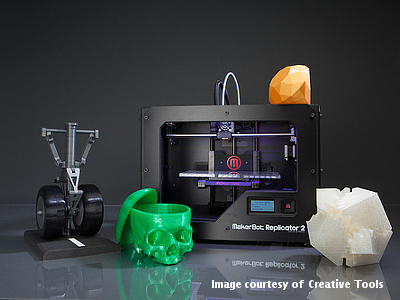3D printing to the new Google phone: news round up 5 August 2013
Posted on 6 August 2013
3D printing to the new Google phone: news round up 5 August 2013
 By Alexander Hay, Policy & Communications Counsultant.
By Alexander Hay, Policy & Communications Counsultant.
3D printing is all the rage these days it seems, with all manner of medical applications being mooted, not to mention Maplin now selling the UK's first (relatively) cheap home model.
Needless to say, this has plenty of open-source applications just waiting to be exploited by researchers. According to Michigan Technical University, a 3D printer could save the average home around $2,000 a year, based on what it is being used to make and whether open-source designs are used instead of proprietary equivalents.
That does, of course, factor in the cost of electricity and materials used to knock together a plastic mug, though this depends a great deal on what you choose to make on a regular basis. With that in mind, a 3D printer would start paying for itself between four months and two years.
But as The Register notes, this really does depend on what you’re using that 3D printer to make and whether you want something usable at the end of the process. It also depends on the assumption that 20 or so items are made each year, which adds another caveat to the model. There are only so many cups you need to buy in a year, for example, unless you’re really clumsy.
For researchers, the benefits would be financial, which is always music to the ears of a principal investigator. Yet again, it really depends on what sort of research you are doing. Precision tools and large or complex machinery are out of the question, while desk-based research isn’t very resource-intensive to begin with. Under the right circumstances, of course, a 3D printer might be just what you need to stay under budget. Or at least, keep you in crockery.
Of more direct relevance for researchers is the self-censorship of a report by its authors, as a story in The Guardian demonstrates. Research by the University of Birmingham and Raboud University (in the Netherlands) has, it seems, the potential to be abused as it features an algorithm that is supposedly able to let you bypass the security systems of, err, Porsches and other high-end cars.
The researchers did not do this in order to protect the feelings of bankers and drug dealers, however. A High Court injunction has forced their hand and so we find ourselves in the uncomfortable position of seeing software research being repressed by legal mechanisms. Volkswagen’s injunction is temporary, but shows all the signs of shooting the messenger.
As the researchers point out, the aim of their work was to precisely point out the vulnerabilities of the car security systems in the first place. Of interest, meanwhile, is the difference between the UK and Dutch systems. In the case of the latter, a quarantine is imposed on any research between the point of discovery and the time of publication. In the UK, they just send in the barristers.
As for hardware, Google is about to unleash its Moto X smartphone, the first true Google mobile, as long as you discount all the other devices that use Android. Wired reports that this is also a kind of resurrection for Motorola, developers of the first portable phone, whose acquisition by Google gave the latter the infrastructure it needed to develop the device.
Not to be outdone, Apple has acquired a manufacturer and developer of radio chips which use only peppercorn levels of power. According to Mashable, this could well be a prelude to Apple expanding into the next big tech battlefield – wearable technology, with its rumoured iWatch already registered as a trademark in various countries.
Finally, it’s worth noting that open source isn’t necessarily about software. The free and easy exchange of ideas and knowledge has potential crossover across many fields. Which is to say, open-source airplane designs (Wired) and GMOs (Techdirt) could simply be preludes to a bigger change to how our world works than even 3D printers can promise.
